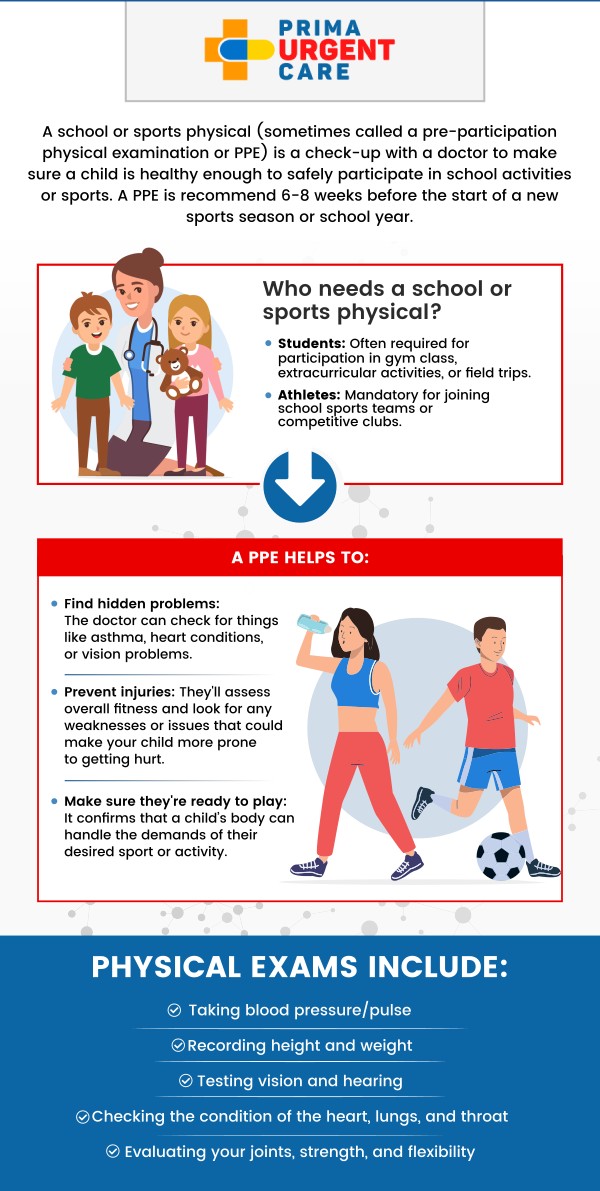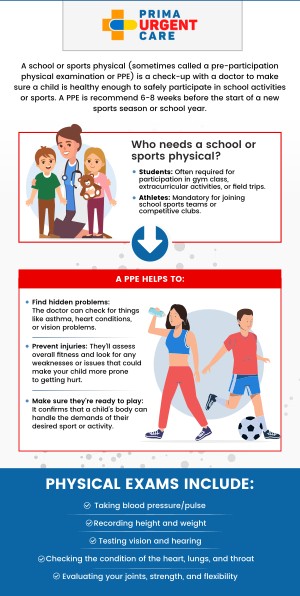Sports Physicals Specialist in Fairfax, VA
Sports physicals are essential for ensuring your child is healthy and ready to participate in sports activities. At Prima Urgent Care, our medical team provides comprehensive sports physicals to evaluate your child’s overall health and fitness. We focus on detecting any potential issues and ensuring they are physically prepared for sports, helping them stay safe while staying active. For more information, contact us or book an appointment online. We are conveniently located at 3903 Fair Ridge Dr Suite Q, Fairfax, VA 22033.




Table of Contents:
What is a sports physical?
What usually happens in a sports physical?
What should I bring for a sports physical?
What are the benefits of sports physicals?
The purpose of a sports physical is to assess an individual’s overall health and fitness, specifically in relation to their participation in sports activities. This examination involves a thorough evaluation of various aspects, including medical history, physical examination, and identification of potential risks. A sports physical serves as a vital tool in determining an individual’s readiness to engage in physical activities and sports. It helps to identify any underlying health conditions that may hinder an individual’s performance or pose a risk to their well-being. During a sports physical, a medical professional reviews the athlete’s medical history, including any past injuries, illnesses, or surgeries. This information provides valuable insights into an individual’s health status and helps to identify any potential risks or limitations.
Additionally, a physical examination is conducted, which includes assessing vital signs, musculoskeletal health, and cardiovascular fitness. This comprehensive evaluation allows healthcare providers to identify any abnormalities or concerns that may affect an individual’s participation in sports. The role of a sports physical in preventing injuries cannot be overstated. By conducting these examinations, healthcare professionals can identify any pre-existing conditions or weaknesses that may make an athlete more susceptible to injuries. For example, a history of previous injuries, such as a sprained ankle or a concussion, can be evaluated to determine the impact on future sports participation. This information enables healthcare providers to provide appropriate recommendations for injury prevention, such as specific exercises or protective gear, to minimize the risk of further injury.
A sports physical comprises several components that collectively contribute to a comprehensive assessment of an athlete’s health and fitness. One crucial aspect of a sports physical is the review of the individual’s medical history. This includes gathering information about any chronic conditions, allergies, medications, or previous injuries. By understanding an athlete’s medical history, healthcare providers can identify potential risks and tailor their recommendations accordingly. The physical examination component of a sports physical involves various assessments to evaluate an athlete’s physical fitness and overall health. Vital signs, such as blood pressure, heart rate, and respiratory rate, are measured to assess an individual’s cardiovascular health. Additionally, a musculoskeletal assessment is conducted to evaluate the strength, flexibility, and range of motion of an athlete’s muscles and joints. This assessment helps to identify any weaknesses or imbalances that may increase the risk of injuries.
Furthermore, a cardiovascular evaluation is an integral part of a sports physical. This evaluation may involve conducting an electrocardiogram (ECG) to assess the electrical activity of the heart. It helps to identify any underlying heart conditions or abnormalities that may pose a risk during physical activities. By evaluating an athlete’s cardiovascular health, healthcare providers can make informed decisions regarding their participation in sports and provide appropriate recommendations for optimizing performance and minimizing potential risks.
Sports physical examinations are comprehensive assessments conducted to evaluate an athlete’s overall health and fitness. These examinations aim to identify any potential health risks that could compromise an athlete’s well-being or hinder their performance. By assessing an athlete’s medical history, physical condition, and potential risk factors, sports physical examinations play a crucial role in ensuring the safety and welfare of athletes. One of the primary reasons why sports physical examinations are essential is their ability to identify underlying health conditions or risk factors that may not be urgently apparent. During these examinations, medical professionals assess an athlete’s medical history, including any previous illnesses, allergies, or chronic conditions. This information allows healthcare providers to gain a comprehensive understanding of an athlete’s health status and identify any potential risks that could impact their participation in sports. Moreover, sports physical examinations also play a vital role in preventing injuries.
By conducting a thorough physical examination, healthcare providers can identify any musculoskeletal imbalances, weaknesses, or limitations that could increase an athlete’s susceptibility to injuries. For example, an athlete with poor flexibility or muscle imbalances may be more prone to strains or sprains. By identifying these issues early on, appropriate interventions can be implemented to mitigate the risk of injuries and optimize an athlete’s performance. In conclusion, sports physical examinations are crucial in ensuring the health and safety of athletes. By assessing an athlete’s medical history, physical condition, and potential risk factors, these examinations help identify underlying health conditions, prevent injuries, and optimize performance. Athletes should prioritize these examinations as an integral part of their overall well-being and athletic journey.
A sports physical examination consists of several key components that provide a comprehensive assessment of an athlete’s health and fitness. These components aim to evaluate an athlete’s medical history, and physical condition, and identify any potential risk factors that could impact their participation in sports. One of the primary components of a sports physical examination is the assessment of an athlete’s general medical history. This includes gathering information about previous illnesses, chronic conditions, allergies, and medications.
By understanding an athlete’s medical history, healthcare providers can identify any potential risks or contraindications to specific sports activities. For instance, an athlete with a history of asthma may need specialized management plans to ensure their safety during physical exertion. Additionally, a sports physical examination also involves reviewing an athlete’s previous injuries and surgeries. This information is crucial in assessing an athlete’s recovery and identifying any residual effects that could impact their performance or predispose them to future injuries. By understanding an athlete’s injury history, healthcare providers can implement appropriate preventive measures or recommend specific rehabilitation protocols to minimize the risk of re-injury.
Most of the time, you don’t need to do anything special to prepare for your annual physical. If you are having blood work, make sure you fast and drink only water for a period before your appointment. Prepare a list of prescription and over-the-counter medicines and supplements that you regularly take.
Physical exams are different from regular exams. Although there is some overlap, PSAs address very specific issues related to your child’s willingness and ability to play a specific sport at a specific ability level. Here are five benefits of personal protective equipment.
• Check current health status.
• Check the basic situation.
• Monitor current health status.
• Prevent future health problems.
• Provide safe physical education.
Visit Prima Urgent Care for specialized and comprehensive care. For more information, contact us or book an appointment online. We are conveniently located at 3903 Fair Ridge Dr Suite Q, Fairfax, VA 22033. We serve patients from Fairfax VA, South Riding VA, Dulles VA, Chantilly VA, Stone Ridge VA, Oakton VA, Legato VA, Burke VA, Oak Hill, Lees Corner VA & BEYOND! Our Fairfax location is close to Fair Oaks Hospital, Fair Oaks Mall, and Greenbriar Shopping Center.

Check Out Our 5 Star Reviews


Additional Services You May Like

Additional Services You May Like
- Urgent Care
- COVID Testing
- Lab Testing
- X-Rays
- Illness
- Injuries
- Immediate Care
- Employment Physicals
- Allergies
- Flu
- Fever
- Broken Bones
- Kidney Stones
- Hormone Replacement
- DOT Physical Exams
- Drug Testing
- Gonorrhea
- Sports Physicals
- School Physicals
- Sexual Infection
- Vomiting
- Erectile Dysfunction (ED) Treatment
- Vaginal Infection
- Abscesses Skin Infections
- Acute Fracture
- Ankle Sprain
- Back Pain
- Bladder Infection
- Ear Infection
- Eye Infections Styes
- Hemorrhoids
- Knee Sprain
- IV Therapy
- Immigration Physicals
- Minor Dislocation
- Neuropathy Treatments
- Psychiatric Services (Depression/Anxiety)
- Shoulder Pain
- Sinus Infections
- Stomach Flu (Gastroenteritis)
- Strep and Sore Throat
- Auto-Accidents
- Vision Testing
- Pre Op Physicals
- Medical Weight Loss
- More Services



